Related Research Articles

The history of the Kyrgyz people and the land now called Kyrgyzstan goes back more than 3,000 years. Although geographically isolated by its mountainous location, it had an important role as part of the historical Silk Road trade route. Turkic nomads, who trace their ancestry to many Turkic states such as the First and Second Turkic Khaganates, have inhabited the country throughout its history. In the 13th century, Kyrgyzstan was conquered by the Mongols; subsequently it regained independence but was invaded by Kalmyks, Manchus, and Uzbeks. In 1876, it became part of the Russian Empire, remaining in the USSR as the Kirghiz Soviet Socialist Republic after the Russian Revolution. Following Mikhael Gorbachev's democratic reforms in the USSR, in 1990 pro-independence candidate Askar Akayev was elected president of the SSR. On 31 August 1991, Kyrgyzstan declared independence from Moscow, and a democratic government was subsequently established.

The politics of Kyrgyzstan, officially known as the Kyrgyz Republic, takes place in the framework of a presidential system representative democratic republic, whereby the President is head of state and the Chairman of the Cabinet of Ministers is head of government. Executive power is exercised by the government. Legislative power is vested in both the government and parliament. The Economist Intelligence Unit rated Kyrgyzstan an "authoritarian regime" in 2022.

Kyrgyzstan, officially the Kyrgyz Republic, is a landlocked country in Central Asia, lying in the Tian Shan and Pamir mountain ranges. Bishkek is the capital and largest city of the country. Kyrgyzstan is bordered by Kazakhstan to the north, Uzbekistan to the west, Tajikistan to the south, and China to the east and southeast. Ethnic Kyrgyz make up the majority of the country's 7 million people, followed by significant minorities of Uzbeks and Russians.
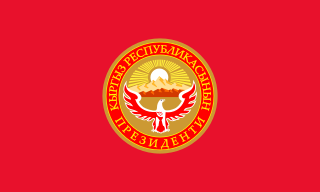
The president of Kyrgyzstan, officially the president of the Kyrgyz Republic, is the head of state and head of government of the Kyrgyz Republic. The president directs the executive branch of the national government, is the commander-in-chief of the Kyrgyz military and also heads the National Security Council.

Felix Sharshenbayevich Kulov is a Kyrgyz politician who served as the 9th Prime Minister of Kyrgyzstan from 2005 to 2007, following the Tulip Revolution. He first served from 1 September 2005 until he resigned on 19 December 2006. President Kurmanbek Bakiyev reappointed him acting Prime Minister the same day, but parliamentary opposition meant Bakiyev's attempts to renominate Kulov in January 2007 were unsuccessful, and on 29 January the assembly's members approved a replacement.

Kurmanbek Saliyevich Bakiyev is a Kyrgyz politician who served as the second president of Kyrgyzstan, from 2005 to 2010. Large opposition protests in April 2010 led to the takeover of government offices, forcing Bakiyev to flee the country.
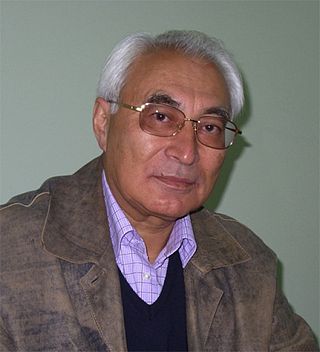
Amangeldy Mursadıkoviç Muraliev is a Kyrgyz politician. He was the chairman of executive committee of council of people's deputies in Frunze in 1988–91, minister of economy and finance in 1991–92, chairman of the State Committee on Economy in 1993–94, chairman of the State Property Fund in 1994–96, governor of Osh Province in 1996–1999, Prime Minister of Kyrgyzstan from April 13, 1999, to December 21, 2000, and president of the Kyrgyz Stock Exchange in 2001–04.

The Supreme Council is the unicameral parliament of the Kyrgyz Republic. It was known as the Supreme Soviet of the Kirghiz Soviet Socialist Republic until 1991.

A new constitution of Kyrgyzstan was passed by referendum on 21 October 2007. It is based on the first post-Soviet constitution originally adopted on 5 May 1993.
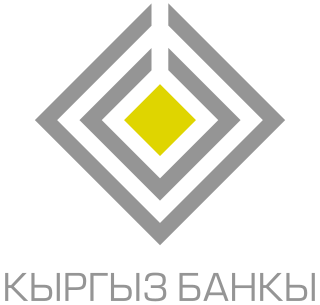
The National Bank of the Kyrgyz Republic is the central bank of Kyrgyzstan and is primarily responsible for the strategic monetary policy planning of the country as well as the issuance of the national currency, the Som.

Kazakhstan–Kyrgyzstan relations refers to the bilateral diplomatic relations between the Republic of Kazakhstan and the Kyrgyz Republic. Bilateral relationships between the countries, which share a border, are very strong and Kyrgyz and Kazakh are very close in terms of language, culture and religion. Kyrgyz-Kazakh relationships have always been at very high level and economic and other formal connections of two countries have been greeted with strong appreciation by both nations since the two share a lot in common.
The Ministry of Emergency Situations of Kyrgyzstan is a special ministry in Kyrgyzstan dedicated to the response of natural disasters such as earthquakes or landslides or serious accidents. The current emergencies minister is Boobek Ajikeev.
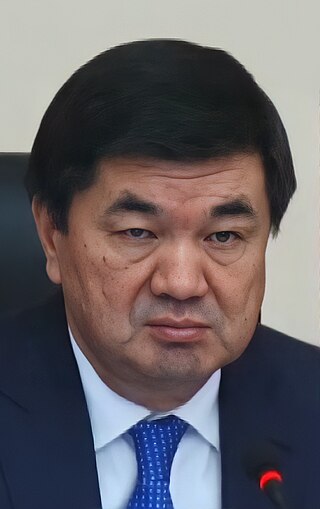
Mukhammetkalyy Duyshekeyevich Abylgaziyev is a Kyrgyz politician. He was the First Deputy Prime Minister of Kyrgyzstan from April 2016 to August 2017, Acting Prime Minister of Kyrgyzstan from 22 August to 26 August 2017, and Prime Minister of Kyrgyzstan from April 2018 until his resignation in June 2020, during a criminal investigation into his government's sale of radio frequencies.

Bakyt Ergeshevich Torobayev is a Kyrgyz politician who has been the leader of the Onuguu-Progress party since 2013.
Salaydin Abdirayevich Aydarov is a Kyrgyz politician and ex-civil servant, and current member of the Supreme Council of Kyrgyzstan.
Anvar Artykovich Artykov is a Kyrgyz politician, and current member of the Supreme Council of Kyrgyzstan. Artykov served as governor of Osh Region between March and December 2005, and was previously a deputy between 1990 and 2000.

The Ministry of Economy and Finance is the Kyrgyz government ministry which oversees the public finances of Kyrgyzstan. It was formed from a merge of the Ministry of Economy and Ministry of Finance after a government reshuffle on 12 February 2021.

Sadyr Nurgojo uulu Japarov is a Kyrgyz politician who is currently serving as the president of Kyrgyzstan since 28 January 2021. He had previously served as the acting prime minister of Kyrgyzstan in the 2020 interim government following the resignation of President Sooronbay Jeenbekov. Japarov also became acting president of Kyrgyzstan after Jeenbekov's resignation but resigned himself on 14 November 2020 to run for the 2021 presidential election, where he was elected to succeed the acting president Talant Mamytov.

Ulukbek Asamidinovich Maripov is a Kyrgyz politician who served as Chairman of the Cabinet of Ministers of Kyrgyzstan from 5 May 2021 to 12 October 2021. He was the first to serve in this position, serving in this position after the post of Prime Minister of Kyrgyzstan was abolished. Prior to being appointed prime minister Maripov had led the Kyrgyz Account Chamber.
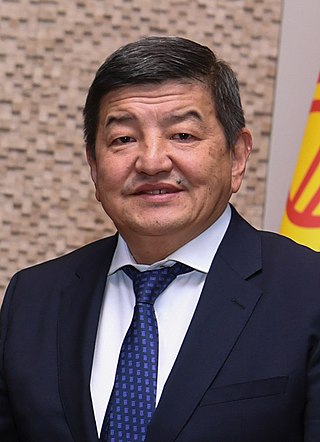
Akylbek Üsönbek uulu Japarov is a Kyrgyz politician serving as Chairman of the Cabinet of Ministers of Kyrgyzstan since 12 October 2021. He replaced Ulukbek Maripov, who had been appointed to the new role by President Sadyr Japarov on 5 May 2021. Aqılbek is also concurrently the Head of the Presidential Administration under President Japarov.
References
- 1 2 3 4 5 "СУЛТАНОВ Марат Абдыразакович | ЦентрАзия". centrasia.org.
- ↑ BOLPONOVA, Asyl. "POLITICAL CLANS OF KYRGYZSTAN: PAST AND PRESENT" (PDF).
- ↑ "Kyrgyz Lawmakers Elect New Speaker". Radio Free Europe/Radio Liberty. 2 February 2012.